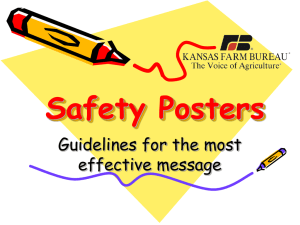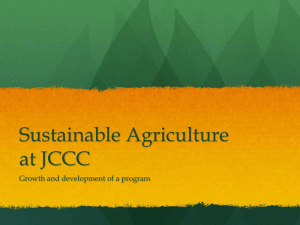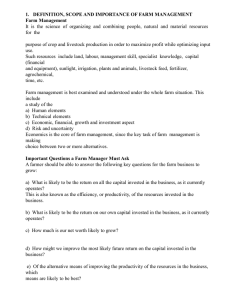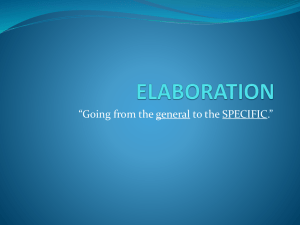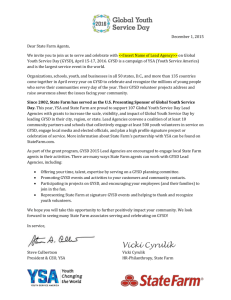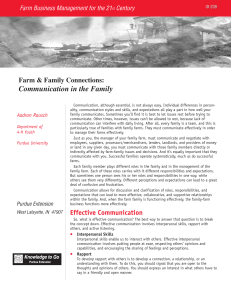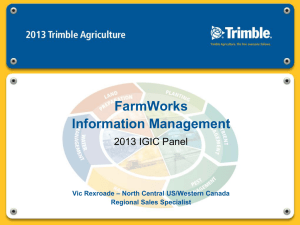YOU - Kansas State University
advertisement
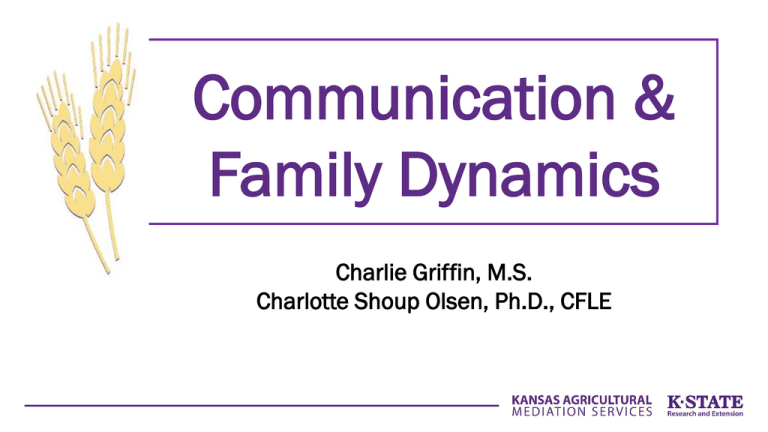
Communication & Family Dynamics Charlie Griffin, M.S. Charlotte Shoup Olsen, Ph.D., CFLE Complexity of Family Business Security fun nurturing Family/ Personal System Ownership System Management System Productivity, day-to-day operations Return on investment, transfer of assets “The future of agriculture lies in the hands of young and beginning farmers. We need to find more ways to help them take the reins of the farm business.“ - Canadian Agriculture Minister Gerry Ritz “Transitioning the older generation from the business is one of the top challenges facing North American Agriculture.” - Dave Kohl and Alicia Morris Virginia Cooperative Extension “Ranchers and farmers are telling us their weakest link is not technology nor information. Their weakest link is human relationship management.” -Robert Fetsch, Colorado State University Cooperative Extension 5 Areas of Risk that Threaten Family Farms Financial Legal Marketing Production Human Resources Challenges to Family Businesses The separation of authority from ownership and management. Issues of unfairness in the successor generation. Absence of a shared sense of purpose. Communication problems. Lack of formal structures and processes that manage decisionmaking. • Neglect of individual, family and organizational development (Aspen • • • • • Family Business Group, 2004). Common Sources of Farm Family Conflict • Control • In-law relations and competing loyalties • Transfer of property/ownership • Coping differences • Division of income…fairness? • Decision making • Obligations, debts, and risks Farm Transition Planning • Much more than estate planning! • Weaving of Family Life Cycle with Cycle • Combines: - Career Development Plan - Professional Development - Retirement Plan Business Life Economic Considerations • Profitability Pointless to talk about transferring a systematically unprofitable farm or ranch • Feasibility Can we make the payments on proposed expansion plans? • Size Is the business large enough to accomplish goals? The Important Point… These decisions are not independent. All decisions regarding the “structure” of the to be made simultaneously, and at the early planning process….and perhaps again at points. Getting What You Want From Your Family Farm Life • What is most important about having a farm? • What do you value about family life? • What issues do you have with other family members? What conflicts are unresolved? • What do you want to be different in your relations with other family members? • What do you want to stand for and preserve as a family? • What issues does the farm business need to address in the next ten years that will significantly impact the family and me? What’s Your Role in the Farm? • Board of Directors? • Vice President – Upper Level Management? • Division Director? • Labor? Hourly? Salaried? Don’t know? • Investor / Stockholder? (Heir?) How are each of these positions affected by off farm work? Learn to stay in your lane! Management Principles for a Family Business • Shared values • Genuine caring and support each other • Shared power • Mutual respect • Shared expectations • • Shared activities for maintaining relationships Privacy and well-defined interpersonal boundaries • Traditions • Willingness to learn and grow - Dennis Jaffe, “Working With The Ones You Love” More About General Communication How do I get someone to communicate differently? • The only thing you can change is how YOU communicate • How YOU listen • How YOU act • How YOU react • How YOU interact The Big R RESPECT “Words don’t just come out of our mouths and disappear. Rather, they’re a very important means of connecting and have lasting effects and consequences. We need to be mindful of how we speak.” -Author Unknown BUT, how you say it counts more than WHAT you say! 7% WORDS 38% TONE OF VOICE 55% BODY LANGUAGE 100% TOTAL MESSAGE WHAT HOW Thinking Critically About Our Nonverbal Messages • Analyze your own nonverbal behavior. • Observe. Observe. Observe. • Resist temptation to draw conclusions from nonverbal behaviors. • Connect and relate. How to Become a More Effective Listener • Always show respect for the speaker. • Know when to be a passive listener. • Know when to be an active listener. • • • Paraphrase the speaker’s meaning. Express understanding of speaker’s feelings. Ask questions. Three Ways to Respond to Bids for Communication • Turning—toward responses. • Turning—away responses. • Turning—against responses. YOU One More Thing… Remember to enjoy each other and to regularly show appreciation to each other (in the way the other person likes)!! And Another Last Thing! Two Surprisingly Simple Truths for Married Couples • Happily married couples behave like good friends. • Happily married couples handle their conflicts in gentle, positive ways. CONTACT INFORMATION Charlie Griffin, M.S., Research Assistant Professor School of Family Studies and Human Services Programs for Workplace Solutions, A211 Edwards Hall Phone: 785-532-2025 Email: cgriffin@k-state.edu Charlotte Shoup Olsen, Ph.D., CFLE Family Systems Specialist, K-State Research & Extension Family Studies & Human Service Phone: 785-532-5773 Email: colsen@k-state.edu Kansas State University Manhattan, KS 66506

